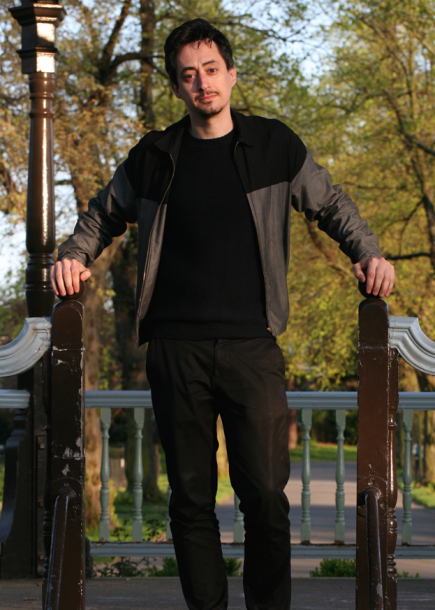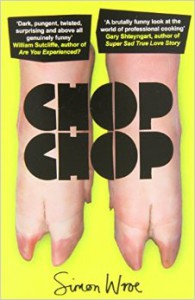Simon Wroe is a chef turned author whose first novel Chop Chop was shortlisted for the prestigious 2014 Costa First Novel Award. With the book just out in paperback, Barney Evison met Simon to discuss writing, cheffing and sadistic head chefs.

To be nominated for a Costa Award is surely a dream come true for a debut novelist, promising mainstream approval and changing the fate of their book. But how does it really feel to be on the Costa shortlist? “I was surprised and delighted – I thought it was a mistake at first,” said Simon. “I had written this book that was slightly mad and populated with grubby characters, set in the small, hermetic world of chefs. I always thought those prizes were for other books about weightier themes.”
“Slightly mad” just about sums up the world depicted in Chop Chop. It’s a compelling, pacy novel which follows foppish young graduate Monocle as he gets a job on the bottom rung of a Camden gastropub kitchen called The Swan and is introduced to the mad, bad world of professional cheffing. The pages are laden with profanity and outrageous characters, from a sadistic head chef called Bob to a grotesque and shady gangster known only as The Fat Man.
The lurid world of the professional kitchen, as depicted in Chop Chop, is a small step away from a lunatic’s asylum. It’s a menacing, male-dominated alternate universe where the usual rules don’t apply. Is this what professional cheffing is really like? Having worked as a dishwasher in a restaurant for six months myself I have an inkling of the kind of ribaldry and joking that goes on in a kitchen, but still didn’t recognise the world of Chop Chop.
 “Some kitchens really are absolutely like that,” insists Simon. “People say ‘you made it over the top didn’t you’ and I honestly didn’t – the dialogue and the scenarios could happen on any evening in any kitchen.” He didn’t set out to write an exposé about kitchens, he tells me, but Chop Chop may open some readers’ eyes. Let me just say that Gordon Ramsay at his worst on Kitchen Nightmares is nothing compared to some of the characters in Simon’s book.
“Some kitchens really are absolutely like that,” insists Simon. “People say ‘you made it over the top didn’t you’ and I honestly didn’t – the dialogue and the scenarios could happen on any evening in any kitchen.” He didn’t set out to write an exposé about kitchens, he tells me, but Chop Chop may open some readers’ eyes. Let me just say that Gordon Ramsay at his worst on Kitchen Nightmares is nothing compared to some of the characters in Simon’s book.
The last place Simon worked was a gastropub in North London that bears many similarities to The Swan of Chop Chop. Simon insists it will remain nameless. “Did you work for a Bob [the dictatorial head chef in Chop Chop]?” I ask. Simon nods. Bob’s idea of a true chef is one whose hands are a mess of cuts and burns – to the extent that he will deliberately burn his employees if he thinks they’re too soft.
The other chefs in Bob’s kitchen are more likeable; foul-mouthed rogues who all seem to be on the run from something. “The kitchen seems to be a repository for transient types,” says Simon. There’s definitely a certain romance to the lifestyle of a big city chef, if you can look past the low pay and long hours.
Simon’s worked at several restaurants and pubs in Brighton and London, including the critically acclaimed Terre A Terre which is famed for its complex vegetarian food. It was “excellent but the mise en place was nightmare”. He got inspiration for Chop Chop from diaries he kept while working in stressful kitchens – “I’d creep off into the walk-in fridge or dry store and note down what was happening.”
Simon thinks everyone should try a job in cheffing. The intensity during service, when you have seconds to prepare a perfect dish while juggling five others on the go at the same time, is like nothing else. “When everything is going your way it’s an addictive and amazing feeling,” says Simon. The Swan’s hapless pastry chef demonstrates what happens when it’s not in Chop Chop, and suffers a near-nervous breakdown during one service. Admittedly he’s covering for another chef, who’s been locked in the walk-in fridge by Bob.
Simon’s book unfortunately didn’t get the Costa Award, but as it’s out in paperback this month why don’t you judge it for yourself? Chop Chop is available in all good bookshops or online as an ebook.













